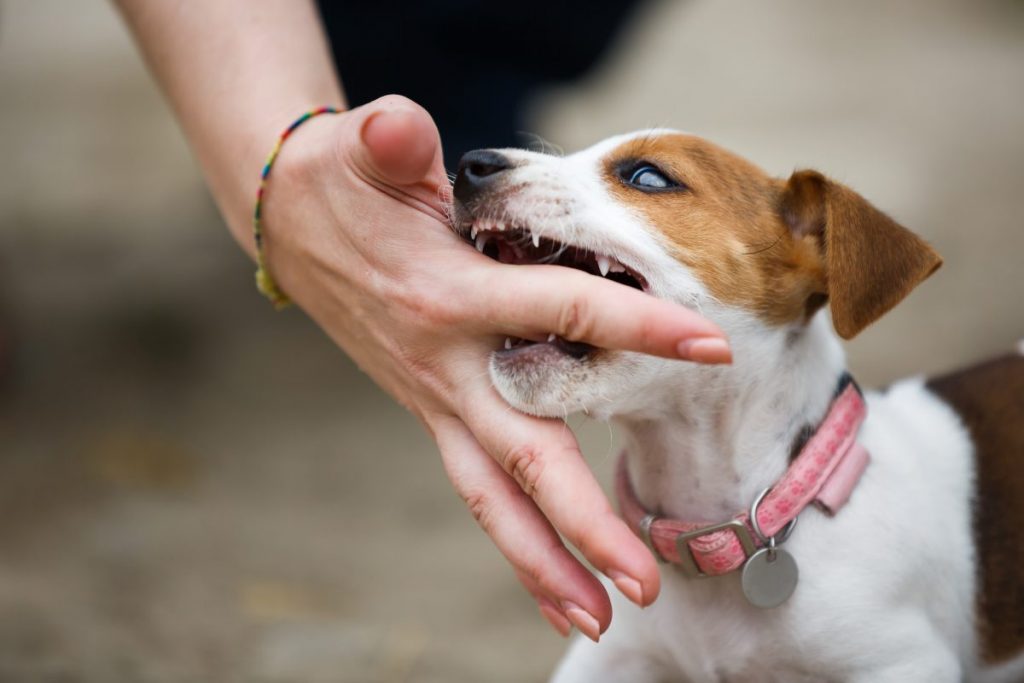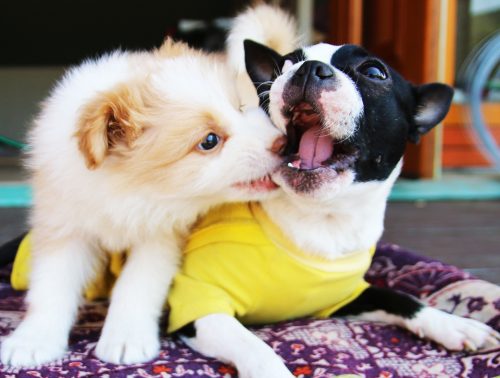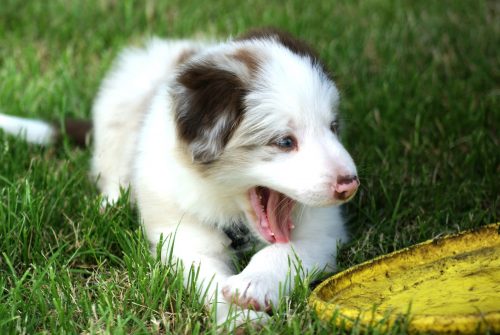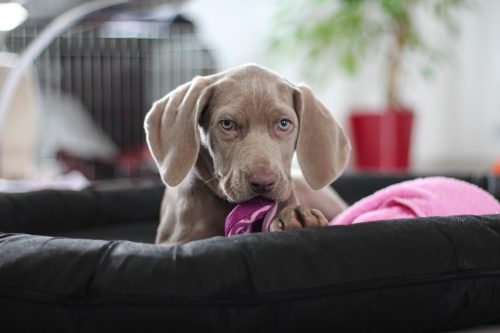Fun (or not fun) fact: puppies bite. And cute as it may be — your adorable puppy’s teeth are like little daggers that can really hurt.
But a puppy that bites isn’t necessarily a bad dog. In fact, it’s perfectly natural behavior and probably nothing to worry about for the long term at all. It’s actually important for puppies to bite in order to learn how not to use their mouths.
This will help them not have a reactionary bite later in life if they are put in a stressful situation. You just have to learn how to cope with the biting and be patient with your puppy’s learning process. Remember: a puppy is just a baby!
And though a puppy biting, chewing, or mouthing on your or other people’s hands, limbs, and clothing sure is cute for now, imagine if you do nothing and your puppy continues the behavior as he gets bigger. It probably won’t be too cute or fun for very long. Therefore, it’s best to start teaching your puppy that biting is an undesirable behavior early on.
Luckily, there are several things you can do to get your puppy to stop biting. The ultimate goal is to get your puppy to stop putting his mouth on people altogether, but first you need to teach your dog to be gentle with his mouth, because people have sensitive skin. And fortunately, the first step to your pup’s learning process will actually happen naturally before you even take him home.
Don’t Separate Your Puppy from His Mother & Littermates Too Soon
If you get your puppy from a breeder, you will want to make sure you don’t take him home too soon. This is because puppies will initially learn how to not bite too hard from their mother and littermates. If one puppy bites another too hard while playing, the other puppy may get angry and things will turn serious. If a puppy bites his mother too hard, she will be even less tolerant.
Young puppies often play quite rough with each other, but often when one reacts to another biting too hard, the biter will let go immediately. However, sometimes the puppy may run to another littermate, or even a nearby child, and bite them instead. For this reason, it’s best to keep plenty of puppy chew toys around. You don’t want your puppy to redirect his biting tendencies toward you or your family.
It is most often suggested that puppies stay with their mother and littermates until they are 10 weeks old. This gives the puppy some time to learn appropriate behaviors from his mother. During this time period, your puppy will also learn how to communicate with other dogs. This will make him less likely to fight or be attacked by other dogs for failing to communicate properly as he grows up.
Why 10 weeks? Research shows that puppies begin to develop fears and phobias when they are seven to nine weeks old. This is actually the worst time to take a puppy away from his mother, siblings, and original human family. When a puppy reaches 10 weeks, he will be better able to adapt to new situations and be less afraid of a new home with new sounds and smells, etc.
During this learning period, and much of a puppy’s early life, it is important for him to socialize with humans as well. Well-socialized puppies will be the best companions, while anti-social dogs are often much more difficult.
Since your puppy is too young to take to a dog park, you’ll want to invite people to your home to get to know your new family member. Try to incorporate a wide variety of people, including children, men, and even some strangers.
It is for these reasons that puppies that come from breeders are often less work initially than rescues. Puppies need that that time to learn from their mother. However, they aren’t doomed without it. There is still plenty you can do to teach your pup that biting is not appropriate.
Regardless, you should always try to learn as much about your puppy as you possibly can before you take it home. Ask about what its early life experiences were and how it interacts socially with other dogs and people. Learning as much as you can about your new puppy project can go a long way to help you understand what you’re getting yourself into and be patient with your new dog.
How to Train a Puppy Not to Bite
Let your puppy bite your hands while playing. When he bites too hard, cry out in a high-pitch yelp to indicate you’re hurt and let your hand go limp. Your puppy should startle and stop for a moment. Continue playing and repeat the process to train your puppy not to bite. If this strategy seems to have no effect, you can remove your hand when your puppy bites too hard, and ignore him. This acts as a sort of time out. You may even need to walk away. After 20 seconds or so, start to play again, but stop if you are again bitten too hard.
Bite Inhibition
No matter your puppy’s upbringing and social interaction, the first step to get it to stop biting is to teach it how to be gentle with its mouth. This is a process known as “bite inhibition.” Puppies need to learn bite inhibition to understand the sensitivity of human skin. Those that don’t will bite too hard, even when they are just playing.
Many puppies will learn inhibition during their playtime with littermates and other dogs and puppies, and it will be a similar process learning from you. Think about a pair of puppies that stop playing for a moment when one bites too hard. They’ll usually stop when the other cries out, then resume. This is how they learn what’s too hard and how to be gentle so it continues on as play. It’s the same process with humans.
You can also utilize a more literal time out where you keep your leash attached to your puppy during the training. Instead of trying to ignore your puppy or walk away, take him to a quiet area and tether your dog there for a few minutes. Then, return and untie your pup and resume your activity. Repeat the tethering as needed, but be sure to make the reason why as obvious as you can, with a strong vocal reaction to the biting.
Gradually, you can tighten up your rules to make your puppy be more and more gentle. Over time, your puppy will learn how to play very gently with his mouth.
Redirect Your Puppy’s Biting
Another useful tactic when trying to get your puppy to stop biting is to redirect the bite to a toy that the dog is allowed to bite. When he tries to bite your hand, move it away and wave the toy around until he bites the toy. This will help the dog learn that biting toys is good, but biting human skin is not OK.
You can also switch to other games like fetch or tug of war. With fetch, it’s important to teach your dog to “let go” or “leave it” on command, so you can remove something from his mouth without him getting aggressive. Likewise, with tug of war, you want to make sure the game doesn’t get too rough, as this can encourage aggressive behavior and also isn’t good for your dog’s mouth.
The eventual goal with these tactics is that when your dog feels the urge to a bite, he will look for a toy rather than come at your hands or feet. When he does this, you can reward him with a treat to reaffirm the good behavior.
Another strategy is to distract your puppy with treats. Some puppies will get riled up just from petting or any basic physical contact. If this is the case, pet your dog with one hand, and use the other to distract him with treats or even a chew toy.
Use Deterrents
When any of the strategies above aren’t enough, you can take things a step further and use something that will deter your puppy from biting. There are products available that you can spray on the things you don’t want your puppy to bite that will have a very displeasing taste. You can spray it on the areas of your body or on clothing.
When you use one of these products, you should first introduce the smell and taste to your dog on its own. Put it on something small that your dog will spit out. This is an important first step to put the smell and taste in your dog’s mind as something that he does not like.
Spray the product onto yourself before you play with your puppy, and if he bites on one of those areas, stop moving and wait for the reaction to the bad taste. If the puppy stops biting you at that time, you can praise him when he lets go to reaffirm the behavior. During this training, you should also withhold water from your puppy, though it may seem cruel. If your dog can just wash out his mouth right away, the deterrent will be ineffective.
You can apply this tactic for as long as it takes for the behavior to set in, but typically around two weeks. After that much time, your puppy should learn to stop biting because of the bad taste he gets every time.
What to Do About Ankle Biters
Sometimes you’ll have a pup that takes biting beyond just your hands. If you have a puppy that loves to nip at your feet and ankles when you walk, you’ll definitely want to nip that behavior in the bud early. This behavior is especially common in herding breeds.
To get your puppy to stop biting at your ankles, keep a toy in your pocket when you are on the move. If your puppy starts to bite, stop moving and wave the toy around to get his attention until he bites the toy.
In instances of ankle biting when you don’t have a toy handy, wait for your dog to release on his own and then praise the action. This teaches your dog that he will be rewarded for good behavior. Eventually, your dog should stop nipping at your heels.
What Not to Do When Your Puppy Bites
There are a few common things dog owners do when their puppies bite that should actually be avoided. For instance, there are several actions that will actually entice your puppy to play harder. These include waiving your fingers or toes in your puppy’s face or slapping the sides of the dog’s face to get him to play. This will actually encourage biting and even cause your puppy to bite harder.
Punishing your dog physically can make him more aggressive or act out out of fear. Avoid any punishments that can hurt or scare your dog.
You also shouldn’t jerk your hands or feet away from your puppy when he bites, because it will encourage the dog to jump forward and grab for you. It’s much more effective to let your hands or feet go limp so your puppy won’t find them to be much fun to play with.
Above all else, don’t discourage your puppy from playing with you. Playing with your puppy will build a strong bond between you and the rest of your family. You want to teach your puppy to play gently, rather than not play at all.
Dealing with a biting puppy takes patience and understanding, but remember it’s normal behavior for a young dog. However, if you think you need help, seek a professional dog trainer for assistance.








